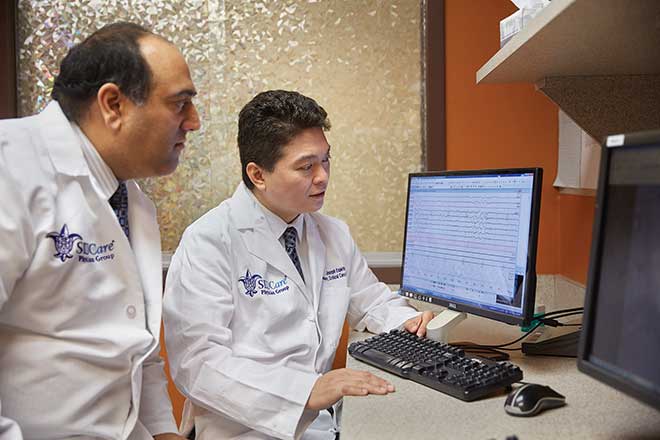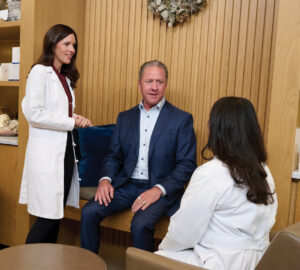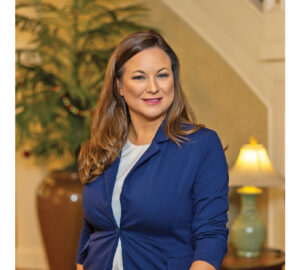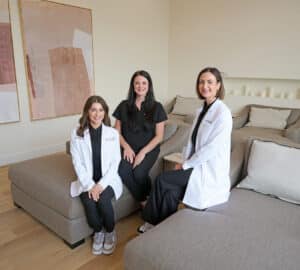“I kept complaining of acute fatigue. For five to 10 years it escalated,” says Betty, an information technology professional. “I have a highly technical job, so attention to detail is critical. I had a tendency to be unable to focus and concentrate.”
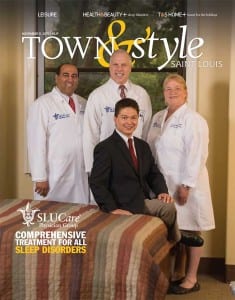 Diagnosis was elusive, she says. “I was repeatedly told, ‘It’s just stress.’” Last year, Betty (who asked that her real name not be used) was referred to the SLUCare Sleep Disorders Center. A detailed physical exam revealed respiratory allergies limiting her pulmonary function and causing sleep apnea, although she did not realize she was symptomatic. An overnight sleep study found that her body was not achieving deep-stage REM sleep. “That was the pivotal point,” she says.
Diagnosis was elusive, she says. “I was repeatedly told, ‘It’s just stress.’” Last year, Betty (who asked that her real name not be used) was referred to the SLUCare Sleep Disorders Center. A detailed physical exam revealed respiratory allergies limiting her pulmonary function and causing sleep apnea, although she did not realize she was symptomatic. An overnight sleep study found that her body was not achieving deep-stage REM sleep. “That was the pivotal point,” she says.
“Sleep is one of the pillars of a healthy life,” says Dr. Raman Malhotra, co-director of the SLUCare Sleep Disorders Center. “It is as important as exercise and nutrition. It affects every organ system: the brain, heart, blood pressure, sugar control, you name it.” Sleep deprivation can feel devastating, he adds. “All of us have experienced it. You feel miserable. It can affect your mood and your performance, whether at work or at home taking care of your kids.”
Sleeplessness compounds other diseases. “If you have painful conditions, your pain worsens. Other medical problems like diabetes and high blood pressure can be more difficult to control. It puts you at risk for more easily catching a cold or viral illness,” says Malhotra, who is certified by the American Board of Sleep Medicine.
Sleep disorders have gathered attention as a distinct medical sub-specialty over the past 30 years, says Malhotra, an associate professor in the department of neurology at Saint Louis University School of Medicine. “There is increasing awareness by the public,” he notes. “Physicians are recognizing that many of their patients have sleep disorders that need to be addressed.”
The precise role of sleep remains somewhat of a mystery, however. “We are still trying to figure out the details,” Malhotra says. “We know sleep seems to serve a restorative role and allows the brain to recover from its daytime activities.” In addition to Malhotra, the center’s medical team includes a pulmonologist, psychiatrist and otolaryngologist.
sleepless nights
Barriers to restful sleep have been well studied. “The most common conditions we see are obstructive sleep apnea, insomnia and restless leg syndrome,” Malhotra says. Obstructive sleep apnea repeatedly interrupts breathing because throat muscles relax and block the airway. It most often affects older adults and people who are overweight. “We think about 25 million Americans have sleep apnea. At best we are treating 10 percent of those,” Malhotra says.

A usual treatment for obstructive apnea is CPAP (continuous positive airway pressure), a device that applies mild air pressure to the mouth and nose. Patricia Dettenmeier, an advanced nurse practitioner at the center, leads clinics to teach patients how to comfortably use CPAP. “We also have an ‘alternatives to CPAP clinic’ for people who have tried CPAP and decided it wasn’t for them,” Malhotra says. “There are other options, such as dental appliances and surgery.”
As for non-apnea sleeplessness, it can have many causes. “Insomnia is being unable to fall asleep, stay asleep or get enough sleep,” Malhotra says. “Stress is often a cause. It can be stress at work or stress from another medical condition. Many times our habits and behaviors make it hard for our bodies to achieve sleep.” Examples would be not setting a regular bedtime or wake time, he says. “Our body likes a normal schedule. A lot of our technologies—tablets, smart phones and TVs— emit light that tricks our brain into thinking there is sunlight and we’re supposed to be up.”
Restless leg syndrome is another condition that creates discomfort during the night. “These patients have sensations in their arms or legs that are difficult to describe. They feel like they have to move their extremities. Moving makes them feel better temporarily, then the sensation comes back,” Malhotra explains.
Less commonly seen are circadian rhythm disturbance and narcolepsy. “Circadian rhythm disturbance occurs when your body’s internal clock, which is controlled by the brain, is not coordinated with the times you would like to go to bed and wake up,” Malhotra says. Narcolepsy is a brain disorder that results in poor control of sleep cycles so patients experience bouts of extreme daytime sleepiness.
Narcolepsy is rare, “but we do see it, being a tertiary referral center,” Malhotra says. “We see patients from St. Louis and rural parts of Missouri and Illinois. People will drive several hours to treat some of the rare conditions like narcolepsy.”
tailored treatments
Screenings search for any issue that may affect the patient’s health. “We do a comprehensive history and examination in the clinic. If further testing is needed, we can offer home sleep testing or a visit to our sleep center, where patients come in overnight,” Malhotra says.
Due to the varied causes of sleep disorders, treatments are individualized for each patient by the center’s specialists. “Fortunately, when we identify the problem, we can offer effective treatments,” he says. “That is what I enjoy about the field: We are able to make our patients feel better.”
Dr. Joseph R. Espiritu, a SLUCare pulmonologist and co-director of the Sleep Disorders Center, guided Betty’s care. “My diagnosis was done thoroughly,” she says. Her sleep apnea had been overlooked because she did not fit the profile of the typical apnea patient. “I weigh 105 pounds. I don’t drink, don’t smoke and lead a healthy lifestyle.”
With treatment for her respiratory allergies and deficient REM sleep, Betty says the improvement in her health is “200 percent. I feel refreshed in the morning. I can concentrate on what I have to do next and function for a long workday. I’m active. I ride my bike and hike. That’s all due to the diligence of the sleep team members.”
[The SLUCare Sleep Disorders Center helps patients diagnose, identify and treat sleep disorders, including sleep apnea. Sleep deprivation can affect mood, performance and health. For more information about the Center, call 314.97.SLEEP or visit slucare.edu\sleep.]
Cover design by Julie Streiler | Photos courtesy of SLUCare Physician Group
Featured image: Drs. Raman Malhotra and Joseph Espiritu





